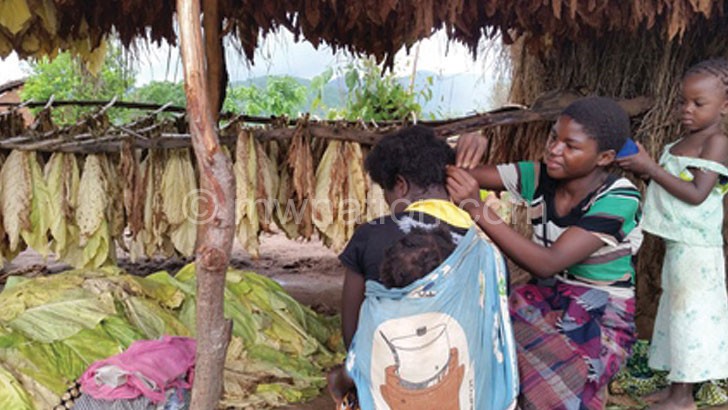The flipside of tobacco industry
At Chilulu Village, a rural setting in Rumphi, tenant farmer Mercy Tambala is worried as the tobacco marketing season is approaching.
It is strange for a tobacco farmer to harbour such emotions. Normally, the marketing season is supposed to ignite joyful feelings, as it means her family will be carting home over K300 000 (about $411) after working in the tobacco field for close to seven months.
But that is not the case with her.

“Last year, my husband went missing immediately he received the money. Reports were rife that he was in town [Rumphi Boma] with other women. He, however, denied it when I confronted him on his return, although he had used most of the money,” she says.
“My worry is that it will be the same this year,” adds Tambala, originally from Chaweza Village, Traditional Authority (T/A) Mwambo in Zomba.
At Mwazisi Village, the western part of the district, the story is almost similar. Wyson Banda, 31, has used tobacco proceeds to marry a second wife.
Banda, who comes from Kondoni Village, T/A Chikwewu in Machinga, was on separation from his first wife during last year’s harvest following his decision of polygamy.
He cultivates on a one and a half acre piece of land on tenancy labour basis. He is given farm inputs, food and healthcare services on loan to return after harvest.
Last year, he produced 16 bales of tobacco from which his share was K267 000 (about $366). That was enough money to drive him crazy and opt for polygamy.
“We reconciled afterwards I had spent all the money. I now have two wives under the same roof,” he says.
Similar tales are told across the district and some parts of Mzimba where tobacco farming forms the backbone of household economy.
During a recent visit to areas such as Ehlaleni, Engucwini, Ekwendeni and Kalama in the area of Senior Chief Mtwalo in Mzimba, most tenant farmers interviewed indicated that they are divorced or live far from their families.
Bomiwa Savula, from Mkozalendo Village, T/A Msabwe in Thyolo, lives alone after he divorced his wife over a quarrel last year.
“I came here in 2012 with my wife, but we divorced. She returned to her village,” Savula says.
The tenant farmers are usually hired from the Southern Region to work in tobacco farms in the North, with the hope of earning a living to support their families back home.
Such tendencies by men to take up new women when they make tobacco money has been listed by the AHL Group as a contributing factor to the spread of HIV, the virus that causes Aids, in the tobacco industry. The industry rakes in 60 percent of foreign exchange earnings and contributes up to 13 percent to the national economy.
AHL Group HIV and Aids coordinator Leonard Chakwawa observes that this is a challenge in containing the virus.
“Money is the driver of HIV in the tobacco industry. When farmers sell their tobacco, lifestyles change. Some indulge in multiple sexual partners, thereby contributing to the spread of the virus.
“Again, the other problem is that most tenants live away from their wives and end up indulging in sexual affairs with other women,” he says.
Chakwawa says it is not only the farmers or tenants who are at risk. He says even transporters are at risk because they spend most of their time at tobacco market centres of Mzuzu, Chinkhoma, Lilongwe and Blantyre.
The National Aids Commission (NAC) 2012 findings vindicate Chakwawa’s assertions. By occupation, it indicates, HIV prevalence is high among truck drivers, vendors, fishers, female border traders, sex workers and police officers.
Chakwawa says AHL came up with an HIV Workplace Policy in 2010 to address the challenge after noticing that the tobacco industry has been sidelined for a long time on issues of HIV and Aids which, in turn, has contributed negatively to the production of quality leaf as many of its growers are in bad health.
Presently, AHL is on a mission to popularise the policy just at a time when Malawi has embraced the ambitious global strategy to end Aids by 2030 by adopting the 90:90:90 targets in its National HIV and Aids Strategic Plan (NSP) for 2015 to 2020.
In the NSP, Malawi plans to have 90 percent of people living with HIV tested and know their status; 90 percent of those known to be HIV-positive be initiated on antiretroviral therapy (ART); and 90 percent of patients be retained in care and adhere to ART by the year 2030.
“Tobacco farming is labour intensive. It needs a healthy workforce. So, we need to manage the virus, otherwise it will manage us. So, through the policy, we are sensitising growers, buyers and transporters across the nation to the need to reduce spreading the virus through various messages,” says Chakwawa.
AHL human resources manager Alfred Mlenga suggests that HIV and Aids messages should be mainstreamed into issues of gender and human rights if the war on HIV is to be won.
In a country where women are the most affected, with an HIV prevalence of 12.9 percent against men’s 8.1 percent, Mlenga argues that women are usually marginalised.
“HIV affects more women than men and yet, although key to the fight, women are marginalised. We need to involve women on issues of HIV rather than assuming things on their behalf,” he says.
During the 2015 World Aids Day commemoration, Minister of Health Dr. Peter Kumpalume pledged government’s support in efforts to defeat the epidemic by the year 2030.
“If we work together, have a common goal, and apply our concerted efforts in the fight against HIV and Aids, we will achieve the 90:90:90 target,” said Kumpalume. n





